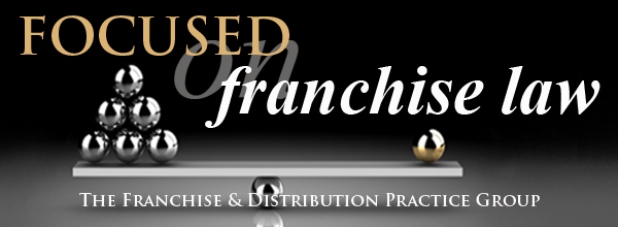Catch-all Disclaimers No Substitute for Untrained Salespeople; and “Two Wrongs Don’t Make a Right”

bkurtz@lewitthackman.com
tgrinblat@lewitthackman.com
msoroky@lewitthackman.com
kwallman@lewitthackman.com
October 2015
38th Annual Forum on Franchising
Barry Kurtz, David Gurnick, Tal Grinblat, Gabe Wintner and Sam Wolf all attended the American Bar Association’s 38th Annual Forum on Franchising in New Orleans. The three day event provides an opportunity for attorneys from around the world to discuss industry-wide legal concerns. David Gurnick spoke on the potential legal risks and opportunities of using intellectual property created by others.
FRANCHISOR 101:
Catch-all Disclaimers No Substitute for Untrained Salespeople

 How strong are “non-reliance disclaimers” or “integration” or “merger” provisions in franchise agreements at protecting a franchisor when it really matters? Only so much, a New York court recently decided.
How strong are “non-reliance disclaimers” or “integration” or “merger” provisions in franchise agreements at protecting a franchisor when it really matters? Only so much, a New York court recently decided.
For protection, franchisors often include “non-reliance disclaimers” in franchise agreements. By signing, the franchisee states they did not rely on any promise or representation which, though not in the printed Franchise Disclosure Document (FDD), was communicated in some way by the franchisor’s staff. “Rather,” the franchisee says, “I understand that only what is actually printed in the FDD is true.”
To cover the other side of the issue and try to prevent any possibility of being bound by such promises, franchisors include an “integration” or “merger” clause in the franchise agreement. By signing, the franchisee agrees that only the terms printed in the agreement and its attachments – and nothing communicated outside of those documents – will actually bind the parties.
Two franchisees claimed they were induced to join the Engel & Voelkers real estate brokerage franchise by fraudulent statements made orally by E & V’s representatives. E & V tried to have the claims dismissed based on non-reliance, integration and merger clauses in the franchise agreements. But the court refused to dismiss the claims and held that the anti-fraud provision in the New York Franchise Sales Act (NYFSA) prevented dismissal of claims just because such clauses were in the agreements.
The franchisees also claimed damage by not receiving FDDs before their first meetings with E & V’s representatives. E & V moved to dismiss these claims as well, arguing that the franchisees could not suffer damage from failure to receive the disclosure at that early point because, ultimately, they received FDDs and were fully informed before they signed franchise agreements. Again the court disagreed, reasoning that the very existence of the NYFSA requirement implies that some harm could come to a franchisee just by beginning to speak with company representatives before having an FDD in hand.
Franchisors cannot depend fully on non-reliance provisions, merger clauses, or a “better late than never” approach to disclosure. A preferable approach is to have salespeople and company representatives trained in the rules and apply disciplined sales procedures.
To read the full opinion, click: EV Scarsdale Corp. v. Engel & Voelkers North East LLC, N.Y. Sup. Ct., para. 15,561.
FRANCHISEE 101:
“Two Wrongs Don’t Make a Right”

At one time or another, many people have occasion to be renters who feel mistreated by a landlord. This may be due to delays in repairs, responses, or just turning on the heat. A typical reaction is the temptation to retaliate by withholding rent. However, someone who watches court TV (or knows someone who does) knows that no matter how much one is in the right, failing to send the rent check is a wrong approach and often makes things worse.
In Dunkin’ Donuts Franchising LLC v. Claudia III, LLC, a Pennsylvania court proved this when owners of a Dunkin’ Donuts franchise did not complete a required renovation of their franchise location, and then stopped paying fees altogether. Due to their defaults, the franchisor terminated the franchise. But the owners continued operating as a Dunkin’ Donuts store, claiming the original default – failure to complete renovation on time – was at least partly the franchisor’s fault, because the franchisee owners had submitted a remodel plan that Dunkin’ Donuts took an unusually long time to approve.
Nevertheless, the court found for the franchisor, issuing an injunction against the franchisee, prohibiting the owners from ever operating a store that used or infringed upon Dunkin’s trademarks. The court noted that even if the franchisee could win its claim that the franchisor was at fault, that would not prevent the franchisor from terminating the franchise. The court held that a franchisee’s remedy for wrongful termination is a claim for money damages, not continued unauthorized use of the franchisor’s trademarks. The court noted that the franchisee never disputed its default nor questioned Dunkin’s ownership of the trademarks, and therefore decided there was no choice but to rule against the franchisee.
Franchisees may have valid claims against their franchisor. But, to continue operating the franchise, a franchisee must stay in compliance with the franchise agreement – even if the franchisor does not. Failure to maintain this contractual moral high ground will give a franchisor the right to terminate.
To read the full opinion, click here: Dunkin’ Donuts Franchising LLC v. Claudia III, LLC, DC Pa., para. 15,584.
